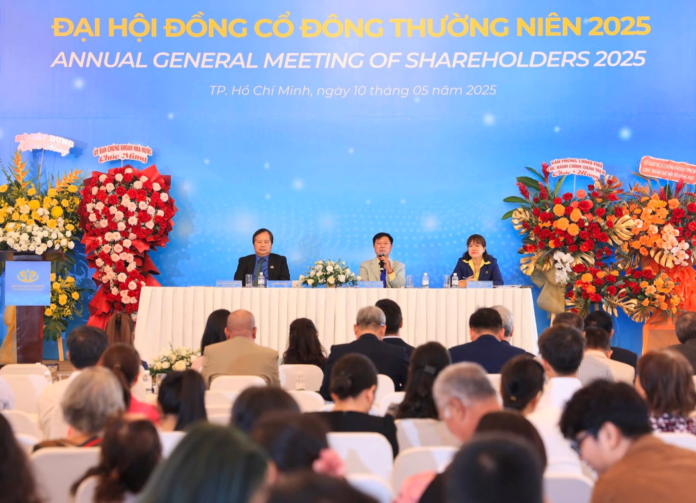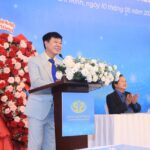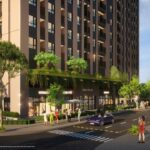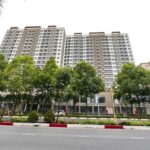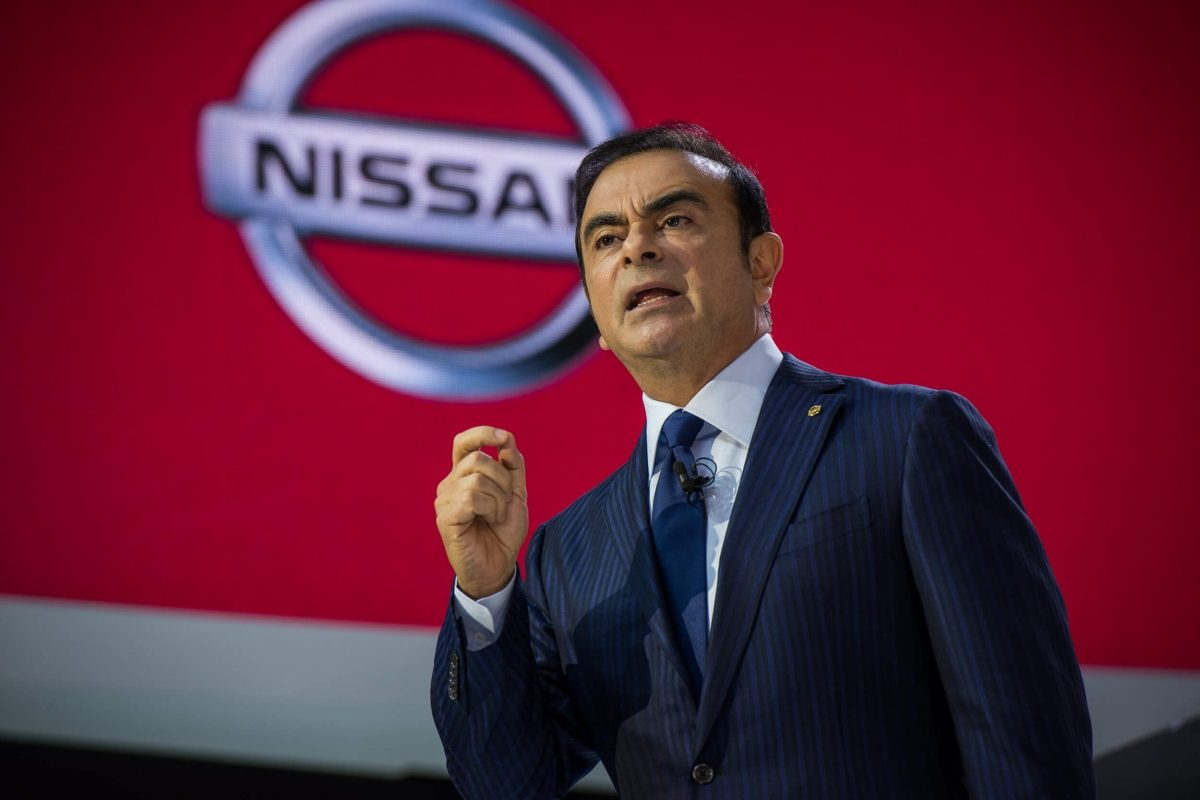Hoang Quan Trading – Consulting – Real Estate Services JSC (stock code HQC) held its 2025 Annual General Meeting of Shareholders, approving the business plan with a revenue of VND 1,000 billion and a profit of VND 70 billion – the highest in the past decade and more than double the previous year.
Issuing 50 million private shares to swap VND 500 billion of debt
The revenue plan is expected to come from the revenue of typical projects, including: VND 800 billion from Golden City Project (Tay Ninh), VND 100 billion from New Urban Area Project in Tra Vinh (Tra Vinh) and VND 100 billion from HQC Tan Huong Project (Tien Giang).
According to HQC, the real estate market is gradually recovering, thanks to supportive policies from the Government. Among them, social housing (NOXH) continues to be prioritized with favorable policies, creating conditions for enterprises to expand land funds and implement new projects. At the same time, the demand for commercial housing (NOTM) and industrial real estate is increasing, prompting enterprises to promote investment to optimize profits and contribute to socio-economic development.
This year, the company sets a target to complete at least 5,000 social housing units. It is known that social housing projects will be implemented in Dak Lak, Vinh Phuc, Da Nang, Hue and Quang Nam. HQC’s Board of Directors identifies access to the VND 120,000 billion credit package as a key factor in supplementing construction capital and promoting the progress of these projects.
At the General Meeting, HQC also proposed a plan to issue 50 million private shares to swap VND 500 billion of debt, with a swap ratio of VND 10,000 debt for 1 newly issued share. The issuance targets are creditors, thereby increasing the charter capital to about VND 6,266 billion. The issued shares are restricted from transfer for a minimum of 1 year.
In 2024, HQC recorded a revenue of VND 346 billion, up 7% compared to 2023. After-tax profit reached VND 34 billion – up 555% compared to 2023.
5 major difficulties of Hoang Quan
Sharing at the beginning of the meeting, Chairman of the Board of Directors Truong Anh Tuan talked about the 5 major difficulties that the Company is facing.
+ First, low revenue and profit: HQC has a capital source of nearly VND 6,000 billion. Revenue and profit in the past 9 years have not met the plan, with a profit of only about VND 100 billion, which is very small compared to the expectation (usually VND 500-600 billion with a capital of VND 6,000 billion).
The minimum revenue in the real estate sector must reach 50% of the charter capital (VND 3,000 billion), but the current figure is much lower. This is considered a very big difficulty.
+ Second, the share price is at a low level: Currently, HQC shares are at VND 3,000/share, much lower than other enterprises at VND 20,000-30,000/share. The big challenge is how to bring the share price back to at least the par value of VND 10,000/share.
+ Third, land fund and large target of social housing: HQC has committed to the Government to build 50,000 social housing units, of which 10,000 units have been completed, and 40,000 units are left to be built. The target by 2030 is to complete the remaining units, equivalent to 7,000-8,000 units per year.
Not to mention, to build 40,000 social housing units, 200 hectares of land are needed, but currently, HQC only has 50 hectares. Meanwhile, the conversion of land into procedures and construction permits is also a challenge.
+ Fourth, large investment capital: With the target of 40,000 social housing units, an investment capital of about VND 40,000 billion is needed, of which a minimum of VND 10,000 billion of medium and long-term loans must be mobilized from banks. Meanwhile, banks only disburse when the project is feasible and has the ability to recoup capital. The challenge is to demonstrate the feasibility of the project (land fund, method, efficiency, and capital flow) to access bank capital and support customers to borrow capital.
+ Fifth, application of technology and ESG standards to projects: This may increase costs, but HQC is obliged to apply.
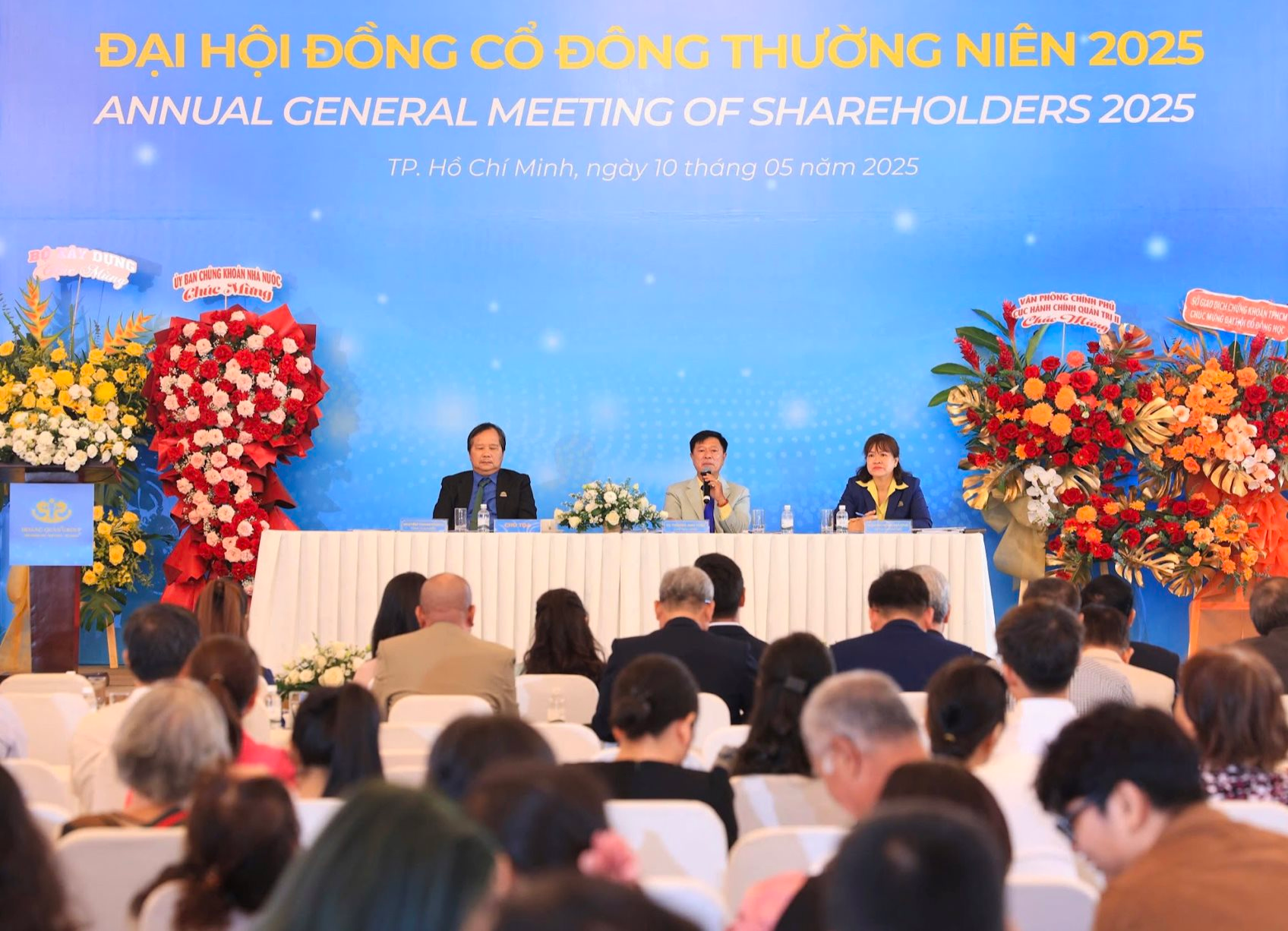
Discussion at the General Meeting
1. Why does the charter capital increase rapidly but the share price decrease?
Chairman of the Board of Directors Truong Anh Tuan: It is true that there is a paradox between capital and share price, but the main reason is due to market influences. In the early stages of listing, the share price of the whole market increased sharply, then tended to decrease, and HQC was also affected.
Subjectively, with social housing, although the handover is on schedule, the profit is not high. Along with that, the suspension of the VND 30,000 billion package for social housing, the impact of COVID-19, and the crisis in 2022 made the market stagnant.
The current HQC share price of more than VND 3,000/share does not reflect the actual health and internal capacity of the enterprise at this time.
2. Does HQC manage its affiliated companies and their debts in a transparent way?
Chairman of the Board of Directors Truong Anh Tuan: This is a big issue that the Board of Directors admits and is focusing on handling. Of the nearly VND 6,000 billion of capital, more than VND 3,000 billion has been invested in affiliated companies. These investments were previously inefficient due to the interruption of the social housing policy. Since 2024, banks have resumed financing and the social housing policy has been strongly promoted through Resolutions and Laws.
From 2025, HQC will implement a strategy to recover investment capital by promoting cooperation, developing projects, and even buying back land/projects in localities such as Dak Lak and Can Tho.
Shareholders need to understand that HQC’s debts in affiliated companies are to develop the land fund. In the coming time, HQC will proceed to recover, for example, the Company has bought back a company implementing the Golden City Project.
3. What is HQC’s strategy for developing industrial real estate in the context of increasing FDI inflows?
Chairman Truong Anh Tuan: Currently, HQC invests in two industrial parks in Binh Minh and Ham Kiem. Recently, the Company has bought back 100% of a new industrial park covering 150 hectares in Binh Thuan and is considering bringing it under HQC or a suitable subsidiary.
However, the development of industrial parks in the past time has faced difficulties due to trade tensions between the US and China and the 46% tax rate, which has slowed down FDI inflows into Vietnam.
The Government is currently in the process of negotiating and HQC believes that an acceptable tax rate will be reached. Even in the context of high taxes, China can still be a major investor in Vietnamese industrial parks due to the need to shift production.
HQC is waiting for the results of the upcoming negotiations to make strategic decisions. If the new industrial park is implemented effectively under HQC, it is expected to bring a revenue of VND 1,000 billion and a profit of about VND 70 billion this year.
4. What is HQC’s orientation for developing smart homes, especially for young people – the main buyers of social housing?
Chairman Truong Anh Tuan: About 70% of HQC’s customers are young people (20-35 years old), who have a high demand for convenient, green, and smart homes. This group is also the focus of the Company’s social housing development strategy.
In the past two years, HQC has experimented with a model of smart and green homes, but it has not been possible to deploy it on a large scale due to many factors that are not suitable. However, in the 2025-2030 term, HQC will comprehensively and systematically integrate criteria according to ESG standards into social housing products.
5. How can HQC develop green and sustainable real estate while ensuring competitiveness in the context of high costs?
Chairman Truong Anh Tuan: Developing green and smart real estate is an inevitable trend, but it comes with challenges in terms of costs and construction progress. HQC is hiring international consulting units to support optimal design and provide appropriate solutions for each project.
The Company will also apply technology in design, construction, and governance to help reduce costs, shorten the progress, and simplify legal procedures. As a result, the final cost can be competitive, even lower than traditional products.
6. What is HQC’s orientation in the field of education and finance, especially in the application of AI?
Chairman Truong Anh Tuan: HQC considers AI (artificial intelligence) an important tool in both education and finance.
In terms of education, HQC starts from the inside, training HQC employees about ESG, design technology, governance, and operations. This training is mandatory.
In the past, HQC contributed capital to 3 universities, 1 research institute, and many other schools. Currently, HQC prioritizes international cooperation.
In terms of finance, HQC has invested about VND 3,000 billion in member companies and cooperation projects. HQC is orienting financial investment in a systematic way, and it is still being built and will be presented clearly at the 2026 Annual General Meeting of Shareholders.
7. Does HQC have any plans to handle debts?
Chairman Truong Anh Tuan: As I mentioned, the debts are mainly HQC’s investments in member companies to accumulate land funds. Previously, it was not possible to recover due to legal obstacles and lack of capital, but since 2025, the conditions for recovery have been met.
8. The Board of Directors has not completed the plan for many years. Will
there be a change of personnel in 2025 to ensure effectiveness?
Chairman Truong Anh Tuan: The Board of Directors of HQC currently has a 70-year-old person, and I am 61 years old. So, we call the current leadership the “golden generation”, who has been with HQC for more than 25 years. And we also consider ourselves determined and experienced.
It is true that HQC has not completed the plan for many years, but I believe that 2025 will be the year the Company breaks through. Looking back at the development process, HQC has had 3 breakthroughs:
+ 2005: Changing the business model to project development;
+ 2010: Listing shares;
+ 2025: A new era of the nation, along with the support from the Government, HQC will also break through.
In addition, HQC also has a “diamond generation” of young and well-trained people ready to succeed. These people are only 40 years old, have been with HQC for 10 years, and are being appointed as CEOs at subsidiaries. We are sure that there will be a transfer of power in 2025, and General Director Nguyen Thanh Phong will become an advisor to ensure a combination of experience and innovation.
Also, please announce to shareholders that this is the first meeting that my three children have attended. Including, Son: Truong Nguyen Hoang Quan
First daughter: Truong Nguyen Song Van (eldest daughter)
Second daughter: Truong Nguyen Hoang Lam.
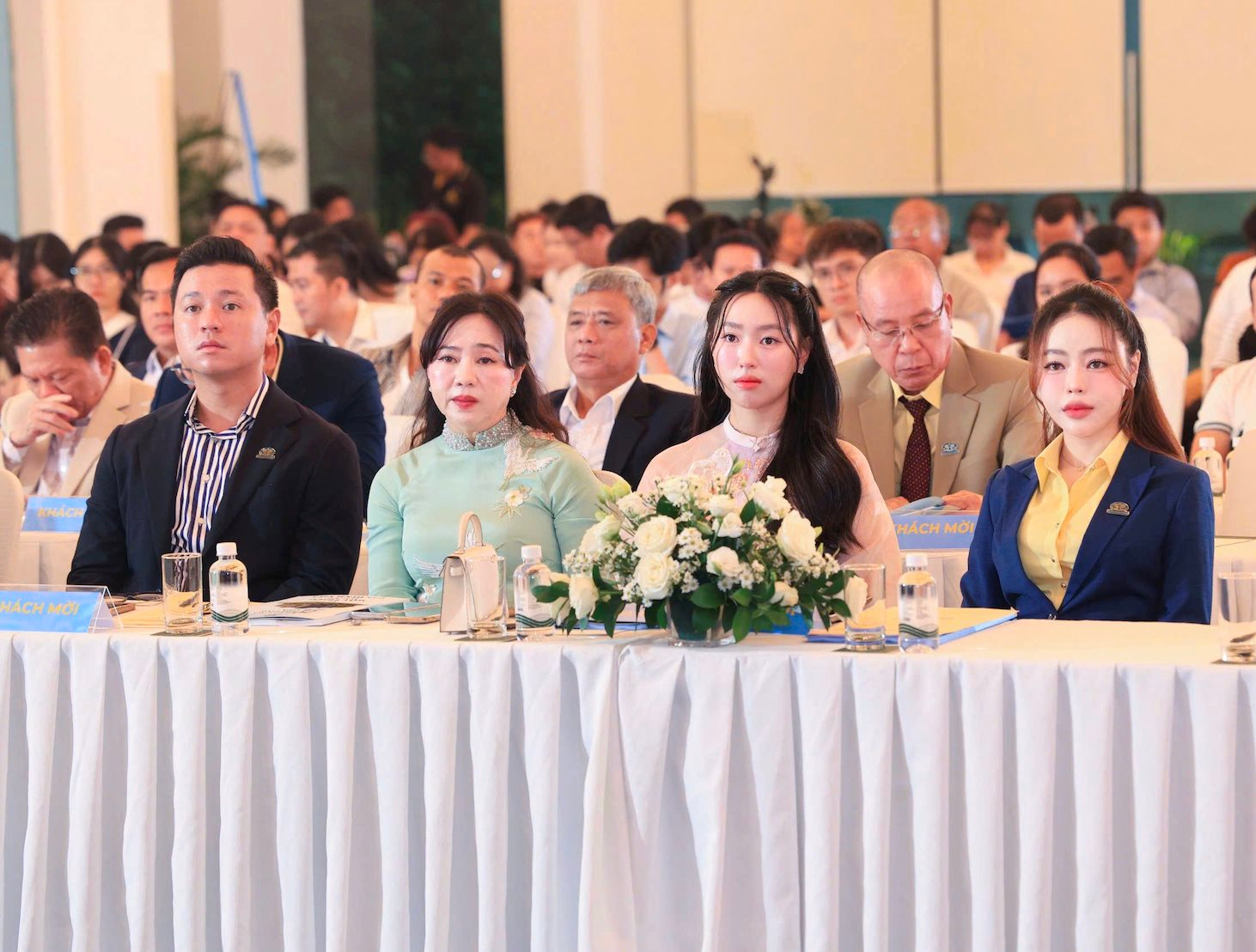
Photo: Chairman Truong Anh Tuan’s three children and wife.
9. What is the current situation of the 198-hectare project in Binh Thuan in cooperation with Hai Phat (HPX)?
Chairman Truong Anh Tuan: Currently, both HQC and Hai Phat have agreed to temporarily suspend the implementation of this project. However, the two sides still maintain the link and will look for new cooperation opportunities in the future. Hai Phat is strong in the North, and HQC is strong in the South.
10. What is the cooperation between HQC and Novaland in the social housing program so far?
Chairman Truong Anh Tuan: Novaland committed to the Government to develop 200,000 social housing units, and accordingly, the two sides are looking for suitable land funds.
At present, the joint venture has piloted a 10-hectare project in Binh Thuan and is reporting to the National Assembly Delegation, Binh Thuan province, and the Ministry of Construction.
11. What is HQC’s specific investment in the US market, and is it affected by the current situation?
Chairman Truong Anh Tuan: The project in the US is a residential area worth about USD 50 million, consisting of 198 units and has been completed, currently for rent. However, this is an investment with personal capital, not related to HQC.
12. Does HQC pity shareholders, who have accompanied the company for a long time but the share price is very low?
Chairman Truong Anh Tuan: Asking if I pity the shareholders, of course, I do. But I also pity myself the most, and my family too because we have invested a lot in HQC.
It is true that the share price is currently low, and we often take the blame, and there is an objective reason that HQC’s additional paid-in capital surplus is currently negative VND 300 billion. Thus, HQC must have a minimum profit of VND 300 billion to increase the share price.
Announcing good news to shareholders, HQC has just paid VND 200 billion in taxes in March 2025, after 5 years. For HQC, this is a large amount of money, and we have paid it, creating a foundation. Surely, this
“A Plea from the Chairman of Hoang Quan Real Estate: Understanding My Dilemma as I Strive to Balance the Interests of Shareholders and My Own”
“The Chairman of Hoang Quan Real Estate confidently asserts that the current stock price of HQC is approximately 3,000 VND. However, he expresses optimism that the stock price will reach 15,000 VND during this term, reflecting the company’s positive outlook and potential for growth.”
The Capital’s New Housing Project: Will the Lottery Frenzy Return?
From now until the end of the year, a slew of social housing projects in Hanoi are expected to be eligible for sale and application acceptance, with prices ranging from over VND 18 million to VND 25 million per square meter. This presents a great opportunity for those seeking affordable housing options in the vibrant city of Hanoi.
Weaving Urban Dreams: TNG Land’s Industrial Evolution
From a textile titan, TNG is diversifying its empire with a foray into real estate. Homie City, a project by TNG Land – an integral part of the TNG ecosystem, is a testament to the company’s strategic evolution. This venture showcases TNG’s passionate and responsible commitment to its homeland, marking a significant milestone in its journey of expansion and diversification.
Should You Invest in Real Estate Amidst the Proposed Merger of Ho Chi Minh City, Binh Duong, and Ba Ria-Vung Tau?
The proposed merger of Ho Chi Minh City with Binh Duong and Ba Ria-Vung Tau provinces offers a unique opportunity to reshape the urban landscape and infrastructure of the region. However, this transitional phase presents inherent risks, especially for new investors entering the real estate market.

